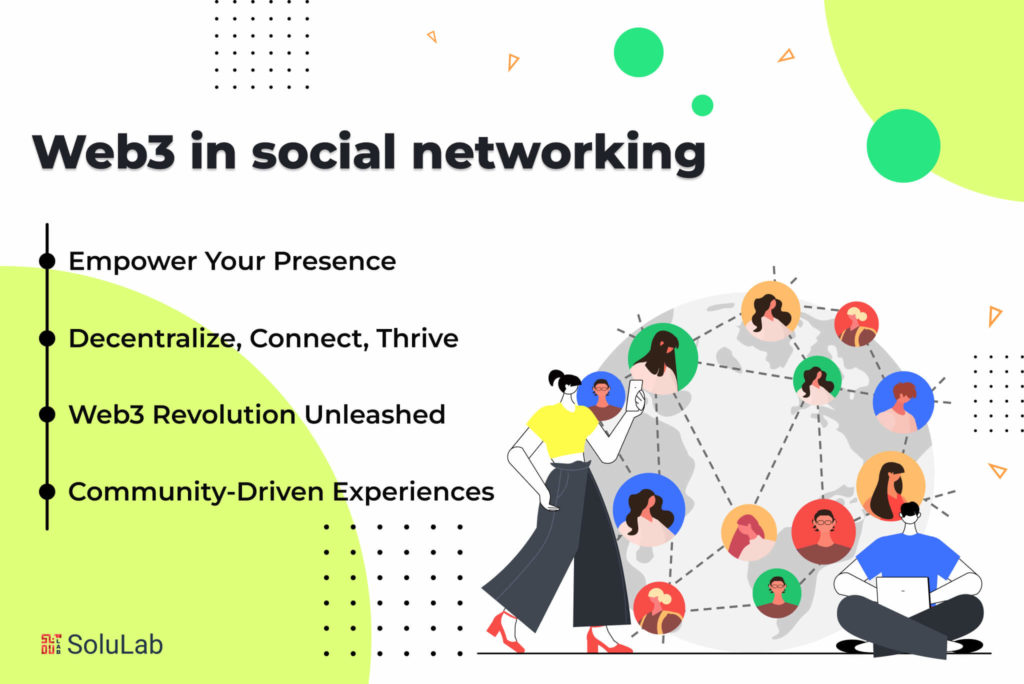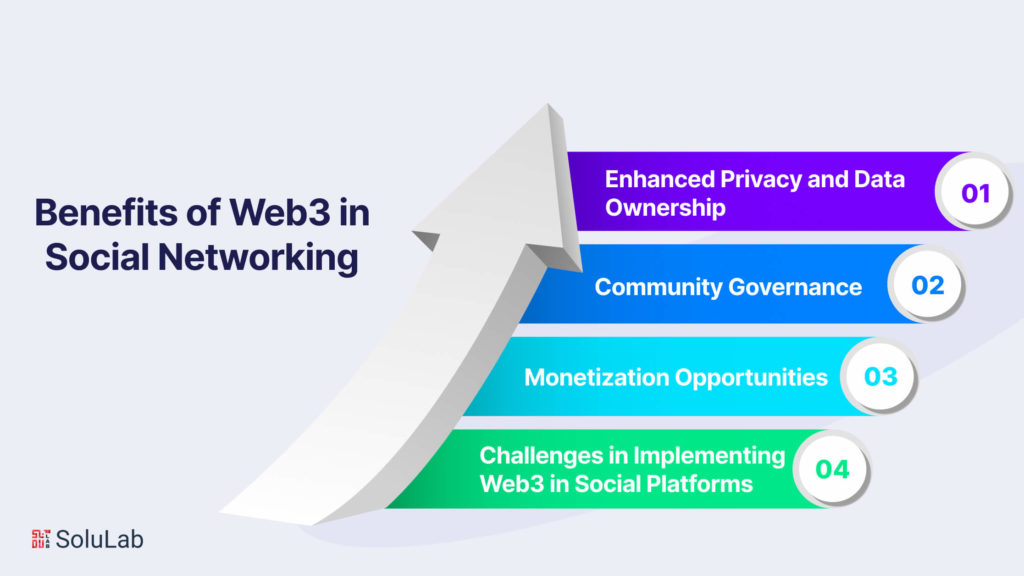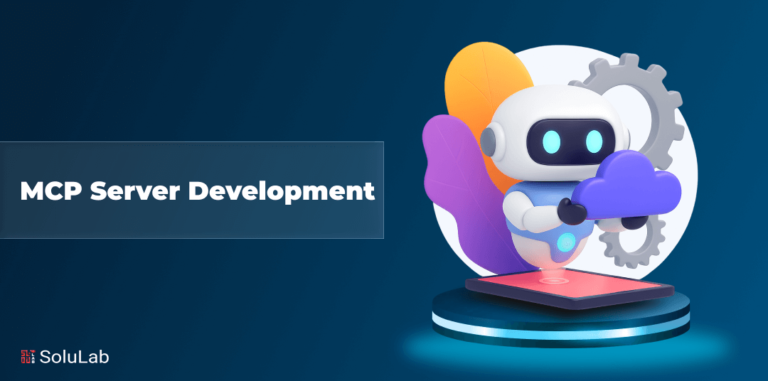
Web3 technology is revolutionizing social networking by introducing decentralization, user empowerment, and novel concepts like token-based incentives and decentralized governance. Unlike centralized social media platforms, Web3 networks are built on a distributed infrastructure, providing users with greater control over their data, privacy, and content. Decentralization mitigates the risks associated with data breaches, censorship, and surveillance. Web3 also enables seamless integration of financial transactions within social networking platforms, allowing users to engage in DeFi in the Web3 era and NFT trading. This guide explores the transformative impact of Web3 on social media, highlighting its potential to reshape online interactions and empower individuals.
Understanding Web3 in Social Networking
Web3 introduces a paradigm shift in social networking, moving away from centralized models. Decentralization offers key advantages: Transparency and security. Decentralization also has the potential to reshape social interactions, enabling users to connect with anyone globally who shares their interests, and fostering a more diverse and inclusive experience. Overall, Web3 offers benefits over traditional centralized social networks by creating a more transparent, secure, and user-empowered environment for meaningful and authentic social interactions.
The Impact of Web3 on Social Platforms
In social platforms, the introduction of Web3 principles ushers in a pivotal era. This section Sets out on a journey an exploration of the profound influence of Web3 on social networking, shedding light on how decentralization fundamentally transforms the user experience, redefines privacy considerations, and reshapes the dynamics of online communities.
Decentralization in Social Media
Decentralized social platforms challenge the traditional, centralized model by distributing control and empowering users. Unlike centralized platforms, which concentrate power in one entity, decentralized platforms make users custodians of their own data, providing autonomy and privacy. Platforms like Mastodon and Diaspora operate on decentralized networks, creating diverse and interconnected social ecosystems. The advantages of decentralized platforms include resistance to censorship, transparency, and the ability to drive innovation in the social media space. They have the potential to reshape online interactions by creating a more equitable and user-centric environment, reducing the spread of misinformation and hate speech. As decentralized platforms gain traction, they can significantly change how we engage online, making it more transparent, inclusive, and empowering.
Tokenization and Incentive Mechanisms
Web3, the next iteration of the internet, is ushering in a new era of digital interactions centered around tokenization. This groundbreaking concept transforms digital assets into vital components of social engagements. Unlike traditional social media platforms that rely on advertising as their primary revenue stream, Web3 introduces a paradigm shift by incentivizing user engagement through cryptocurrencies. This innovative approach empowers users to actively contribute to the growth and success of the platforms they engage with, fostering a sense of community and shared ownership.
Key elements of Web3 tokenization include:
- Decentralization: Web3 operates on decentralized networks like blockchains, ensuring that control and decision-making are distributed among participants rather than centralized authorities.
- Transparency: The transparent nature of blockchain technology ensures that all transactions and interactions are recorded on a public ledger, fostering trust and accountability.
- Interoperability: Web3 platforms are designed to be interoperable, allowing users to seamlessly transfer their digital assets and data across different platforms and applications.
- Cryptoeconomics: Cryptocurrencies and blockchain-based reward systems incentivize users to contribute to the network, participate in governance, and engage in various activities that benefit the ecosystem.
Benefits of Web3 in Social Networking

Explore the multitude of advantages that Web3 brings to social networking. From heightened privacy measures to community-driven governance, this section elucidates the tangible benefits users can enjoy in a Web3-powered social media landscape.
Enhanced Privacy and Data Ownership
Web3, the next generation of the internet, is designed with user privacy as a top priority. Unlike traditional web applications, where user data is often collected and stored by centralized entities, Web3 applications prioritize giving users control over their personal information. By utilizing blockchain technology and decentralized finance protocols, Web3 offers a more secure and private user experience. Users have full ownership and control over their data, reducing the risk of centralized data breaches and unauthorized access. This is achieved through several key features:
- Decentralized Identity (DID) systems: DID systems in Web3 replace traditional username and password logins with a more secure and privacy-preserving approach. DIDs are self-sovereign digital identities that are owned and controlled by the user. They allow users to prove their identity without revealing any personal information. This significantly reduces the risk of identity theft and phishing attacks.
- Data encryption: Web3 applications often employ robust encryption algorithms to protect user data during transmission and storage. This ensures that even if an attacker intercepts data, it remains unreadable and unusable.
- Transparent and auditable transactions: All transactions on the blockchain are recorded on a public ledger, ensuring transparency and accountability. This makes it difficult for bad actors to manipulate or hide malicious activities.
- Reduced reliance on third parties: In Web3, users can interact directly with applications and services without the need for intermediaries or trusted third parties. This reduces the risk of data leakage or compromise that can occur when personal information is shared with multiple parties.
By prioritizing user privacy and providing greater control over personal data, Web3 security empowers users to protect their sensitive information and engage in online activities with increased confidence and trust.
Community Governance
Decentralized governance in social platforms empowers users to participate in decision-making, fostering a sense of community ownership and active participation. It addresses issues of transparency, accountability, and responsiveness by distributing decision-making power among users through mechanisms like:
- Voting: Users can vote on proposed changes to the platform’s policies, rules, and features. This ensures that decisions are made in a fair and democratic manner, reflecting the collective will of the community.
- Delegated decision-making: Users can delegate their decision-making power to trusted individuals or organizations that share their values and interests. This allows for more efficient and specialized decision-making while maintaining community involvement.
- Open governance: All decisions and discussions related to the platform’s governance are transparent and accessible to the entire community. This fosters trust and accountability among users, as they can see how decisions are made and by whom.
Active participation in social platform governance increases user investment and shapes the platforms’ future. Decentralized governance mitigates risks like censorship and data breaches by distributing power among the community. It fosters a sense of community ownership and promotes transparency, accountability, and responsiveness. This governance model is crucial for thriving, inclusive, and sustainable online communities.
Monetization Opportunities
Web3 has revolutionized content monetization for creators. Token-based models introduce microtransactions and disintermediate traditional gatekeepers. Creators can now explore alternative income avenues beyond advertising revenue or platform-specific options. Blockchain technology enables the creation and exchange of digital tokens or cryptocurrencies, representing exclusive content, special perks, or ownership rights via NFT use cases. This transparent and secure nature fosters trust and authenticity, strengthening community and loyalty. Decentralized models eliminate intermediaries and reduce platform dependencies, giving creators control over content, distribution, and revenue. The possibilities unlocked by token-based models are vast, allowing creators to tailor monetization strategies. This flexibility offers increased creative freedom and experimentation. Web3 and token-based models redefine the creator-audience relationship, creating a decentralized, collaborative, and sustainable ecosystem that empowers creators and provides direct support for their contributions.
Challenges in Implementing Web3 in Social Platforms:
Integrating Web3 into social platforms has the potential to revolutionize online interactions and redefine digital ownership and privacy. However, several obstacles hinder its widespread adoption.
- Scalability: Web3’s inherent limitations in transaction speed and scalability may struggle to handle the massive volume of a large user base. Ensuring seamless scalability is essential.
- Adoption Barriers: Complex terminologies and the need for specialized tools can deter non-technical users. Simplifying the user experience and providing educational resources are necessary.
- User Education: Educating users about self-custody of assets, gas fees, and smart contract interactions is crucial to empower them and ensure secure participation in Web3.
- Regulation and Legal Uncertainties: The evolving regulatory landscape creates uncertainties and a lack of clear guidelines. Clarity and consistency in regulatory policies are vital to foster innovation and growth.
- Interoperability: Ensuring seamless interoperability between different blockchains is necessary to avoid fragmentation and foster a vibrant decentralized Web3 ecosystem.
Collaborative efforts from various stakeholders can overcome these challenges, paving the way for the successful integration of Web3 into social platforms and unlocking its transformative potential.
Real-world Examples
Explore real-world scenarios where the incorporation of Web3 principles has revolutionized the social networking realm. Discover groundbreaking advancements, ranging from decentralized identity systems to inventive monetization models. These inspiring showcases offer a glimpse into the transformative power of Web3 in practice.
Existing Web3 Social Platforms
Steem and Hive are successful examples of how Web3 use case can transform social networking. These platforms fundamentally change social engagement dynamics by providing users with token-based systems and decentralized content curation. In Steem and Hive, users actively participate in content creation, curation, and validation, providing them greater control over their data and ownership. Token-based systems incentivize users to contribute valuable content, while the decentralized nature of these platforms allows for autonomy and freedom of expression. Steem and Hive prioritize fairness and transparency using blockchain technology, ensuring the integrity of the system and the authenticity of the content. These platforms pave the way for a more equitable and user-centric digital landscape, demonstrating Web3’s potential to reshape online interactions and value creation.
User Experiences
User testimonials rave about the numerous benefits of decentralized social platforms:
- Enhanced Data Control: Users regain control over their personal data, eliminating concerns about privacy breaches and unauthorized use. They have the freedom to choose how their information is shared, stored, and utilized, fostering a sense of trust and empowerment.
- Flourishing Diverse Communities: Decentralized platforms foster diverse and engaged communities. Free from centralized algorithms and censorship, users can authentically connect, share ideas, and engage in meaningful discussions without fear of discrimination or bias. This diversity of voices enriches the overall social media experience.
- Innovative Monetization Models: Decentralized social platforms introduce innovative monetization models that directly reward users for their contributions. Instead of relying solely on advertising, these platforms empower users to earn rewards through various means such as content creation, curation, and participation in governance. This shift in monetization creates a fairer and more sustainable ecosystem.
- Transparent and Ethical Operations: Unlike traditional social media giants, decentralized platforms operate transparently. Their open-source code and community-driven governance ensure that decision-making processes are transparent and accountable. Ethical considerations are prioritized, safeguarding user data and promoting responsible social media practices.
- Resistance to Censorship and Manipulation: Decentralized platforms are inherently resistant to censorship and manipulation. Their distributed nature prevents any single entity from controlling or altering the content. This resilience ensures that users can freely express their thoughts and opinions without fear of unwarranted censorship or algorithmic manipulation.
By embracing decentralization, social platforms are transforming the way we interact and engage online. These platforms offer a more user-centric, transparent, and empowering social media experience, ushering in a new era of digital communication and community-building.
Future Trends in Web3 Social Networking
The future of Web3 in social networking presents an exciting realm of possibilities, driven by the convergence of cutting-edge technologies. Here are some key trends that are shaping the landscape:
- Virtual Reality (VR) Integration: VR technology is poised to transform the way we interact on social media platforms. Users can expect immersive experiences that transcend the limitations of traditional screens. Imagine attending virtual events, exploring shared virtual spaces, and engaging with others in a more realistic and engaging manner.
- Artificial Intelligence (AI) for Personalization: AI algorithms are becoming increasingly sophisticated, enabling social networks to tailor content, recommendations, and user experiences to an unprecedented degree. This will result in more personalized and relevant interactions, enhancing the overall user experience. AI-powered chatbots and virtual assistants can also provide enhanced customer support and assistance.
- Interoperable Decentralized Protocols: The future of Web3 in social networking lies in the development of interoperable decentralized protocols. These protocols will enable users to seamlessly move their data, identities, and social connections across different platforms without being locked into a single ecosystem. This will foster a more open and inclusive social media landscape, empowering users with greater control over their digital assets.
- Emphasis on Data Privacy and Ownership: Web3 empowers users to regain control of their personal data. Social networks built on Web3 principles will prioritize data privacy and security, giving users more transparency and control over how their information is used. This shift towards user-centric data ownership will reshape the way social networking platforms operate.
- Decentralized Governance: Traditional social media platforms are often criticized for their centralized decision-making structures. Web3 introduces the concept of decentralized governance, where users have a say in the development and direction of the platforms they use. This fosters a more democratic and transparent social media ecosystem.
- Rise of Social Tokens and Creator Economies: Social tokens are digital assets that represent the value and reputation of individuals or communities on social networks. They can be used as a means of patronage, governance, and community building. The rise of social tokens and creator economies empowers content creators to monetize their work directly from their audience, fostering a more sustainable and artist-centric ecosystem.
These trends collectively point towards a future of Web3 in social networking that is more immersive, personalized, decentralized, and user-centric. As these technologies continue to evolve, we can expect to witness a transformation in the way we connect, communicate, and interact with each other in the digital realm.
Conclusion
Embracing Web3 principles in social networking has triggered groundbreaking transformations. The integration of Web3 in social platforms ushers in a user-centric era, offering advantages like enhanced privacy and decentralized governance. SoluLab, a leading Web3 Development Company, guides this metamorphic expedition with its innovative solutions and unwavering commitment to excellence. The skilled Web3 Developers at SoluLab are the architects of this digital revolution. They actualize decentralized visions to forge social platforms that prioritize user empowerment, privacy, and community engagement. These developers leverage their expertise to create a tapestry of possibilities under the Web3 Services spectrum. This empowers users to take center stage in defining their digital experiences, making them active contributors to a secure and community-driven ecosystem.
SoluLab’s comprehensive suite of services aligns seamlessly with this vision, offering cutting-edge solutions that redefine social interactions. The scope of Web3 integration in social networking extends far beyond conventional models, revolutionizing the role of users from mere participants to empowered contributors. SoluLab, a visionary Web3 Development Company, stands at the forefront of this digital revolution. They pioneer the integration of Web3 principles in social platforms, fostering environments where users thrive in privacy, ownership, and meaningful connections. The synergy between Web3 principles and social networking, enabled by SoluLab, creates unprecedented opportunities for user-centricity in the digital realm. Join SoluLab on this transformative journey as we redefine the possibilities of digital interaction. With a steadfast focus on user empowerment, security, and belonging, we pave the way for an era where every user’s Web3 journey is marked by unparalleled experiences. Together, we shape a future where social networking embraces Web3 development trends, ensuring that every user’s digital experience is truly remarkable.
FAQs
1. What is Web3, and how does it impact social networking?
Web3 represents the next evolution of the internet, emphasizing decentralization and user empowerment. In social networking, it transforms traditional platforms into decentralized ecosystems, giving users more control over their data and interactions.
2. How does Web3 enhance privacy in social media?
Web3 introduces decentralized identity (DID) systems and cryptographic principles that significantly enhance user privacy. Users have greater control over their personal data, reducing the risks associated with centralized data breaches.
3. Can Web3 redefine community dynamics in social platforms?
Yes, Web3 fosters community-driven governance. Users actively participate in decision-making processes, creating a sense of ownership and inclusivity within social platforms.
4. What are the monetization opportunities offered by Web3 in social networking?
Web3 introduces novel monetization models, including token-based systems. Content creators can now directly monetize their work through microtransactions, enabling a shift from traditional ad-driven models to community-driven support.
5. How does SoluLab contribute to the integration of Web3 in social networking?
SoluLab, as a leading Web3 Development Company, offers expertise in seamlessly integrating Web3 principles into social platforms. Their innovative solutions aim to enhance user experiences, security, and community engagement.
6. Are there any challenges in implementing Web3 on social platforms?
Despite its potential, the integration of Web3 faces challenges such as scalability, adoption barriers, and the need for user education. Overcoming these hurdles is crucial for the widespread acceptance of Web3 in social networking.
7. What future trends can we expect in Web3 social networking?
Future trends include the integration of Virtual Reality (VR), Artificial Intelligence (AI), and the development of interoperable decentralized protocols. These advancements will further shape the user experience in decentralized social platforms.






